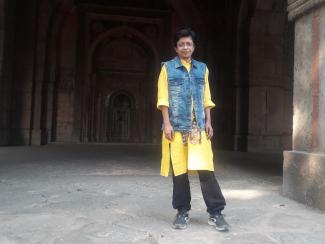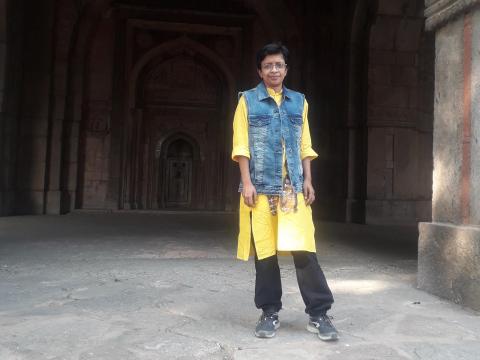
Five years back when she was diagnosed with an early onset of Parkinson’s Disease, much to her disbelief, Sunandita, 45, had everything going for her. Since then, it has been an uphill task living with a condition that has cramped her lifestyle in more ways than one.
Please tell us a little bit about yourself, your background.
I am from a middle-class Indian Bengali family, born and brought up in the suburbs of Kolkata. My father was a Central government employee and mother, a schoolteacher-turned-homemaker. I worked in Delhi in a national news agency till 2011, and then shifted to government sector to work as a communication executive.
Describe your first symptoms in detail.
More than five years back, I started feeling some difficulty in my left leg. I was dragging my left foot, unknowingly, while walking. There was no pain at first, and I ignored it for some time, though friends were pointing out to me that I am limping. It increased gradually and I also noticed another thing – that the fifth toe in my left foot had slightly curled and was kind of stuck with the fourth toe. I could move it back if I used force, but left at rest, it used to go back to the curled position. I went to an orthopaedic doctor who diagnosed my situation as Vitamin D deficiency, and in fact, my Vitamin D was pretty low. After some weeks of treatment, the Vitamin D levels improved, but the other problems remained. By then I started developing a rather painful frozen shoulder, also on my left side. I went to a bone and joint disease specialist, was tested for rheumatoid arthritis, prescribed physiotherapy sessions, went through the sessions, but nothing was working for me.
What was your diagnosis and what medications were you put on?
I had then also started noticing occasional tremors in the fingers of my left hand and someone suggested a visit to a nerve disease specialist. My condition was diagnosed as Parkinsonism by a neurologist in a government hospital in New Delhi. Somewhat tense and wanting to be near my family, I went to Kolkata (my mom and two elder sisters live there), and visited a reputed neurologist who confirmed the same diagnosis after necessary tests and told me to start on Levodopa-Carbidopa medication. I was still in disbelief and finally went for a check-up at the National Institute of Mental Health and Neurosciences (NIMHANS), Bangalore, where I was diagnosed as a patient of Young Onset Parkinson’s Disease. Here, I also came to know that two of the other issues I was facing for some time --- loss of smell and cramped, uneven handwriting – are also connected to PD. Till then I thought that the first was the result of some kind of chronic nose blockage (though I had doubts about how it can stay for such a long time) and the second was due to the lack of handwriting practice in our present age of keyboards.
How did your diagnosis alter your life plans?
Work - at first, it did not affect that much except that I would forget my medication occasionally if there was work pressure, but with time, I started developing more complications, and things became tougher. Now, I sometimes face slow and rigid movement, heightened anxiety even if there is no work pressure and I find it difficult at times to write and type, especially if there is some delay in taking my medication due to any reason. I am, however, continuing with work on the professional front with the help from colleagues and seniors who showed consideration and understanding, and with immense support from my friends and family. But while earlier I used to think that I should do more work, now my target remains to complete the job at hand in time. Modern tools like speech-to-text software are proving to be a boon.
Marriage and family relationships: Marriage was not on the cards then and not on the cards now, so, no change in that respect. I have become closer to my immediate family since PD, and they are a huge support. But sometimes I feel that I am becoming more and more emotionally dependent on them, which frustrates me as I don’t want to burden them. My mom, who is 90 years old, worries a lot about me and I feel helpless as I cannot offer her much assurance that my condition will improve.
Any incidents that you would like to share
Since PD, I have discovered that people are essentially good and want to help you. In days of movement rigidity and dyskinesia (involuntary movement of arms and legs), there have been numerous instances when completely unknown people have gone out of their way to make things easier for me. Recently, during a trip to my hometown, I had to opt for wheelchair assistance at Delhi airport and was really upset about that. I told the guy pushing the wheelchair that I am feeling bad that at my age I had to take this support. The young man, who appeared to be in his twenties, said, “Don’t think about it too much ma’am. You wouldn’t have taken it if you had other options. Just go ahead and do what you need to do. May be next time, you will be fine.” His words struck a chord with me.
Any related complications or co-morbidities that you would like to share? And how do you manage them?
Related complications mostly occur in the form of sleep disorder and increased anxiety at times. I have taken the help of psychologists/counselors a few times.
What does a typical day look like?
Getting up at 6, yoga, reading and listening to music, getting ready for office, work from 10 a.m. to 6 p.m. (on most days), returning home, making phone calls to family and friends, taking some time out for hobbies and social media, dinner, efforts to fall asleep. This is a really ideal day. Many days are spent in a haphazard manner. On weekends, I used to meet friends, watch a movie or go for a heritage walk (I love Delhi monuments), although lock-down restrictions have affected such plans for the last two years.

What is the most challenging time of day?
Getting ready for office, because the more I try to rush and do things on time, the more I suffer from stiffness. A simple thing like putting on a pair of shoes takes too much time on some days because I find it difficult to slide my feet into the enclosed space of sneakers. I am also constantly looking for a pair of shoes that will be comfortable and won’t cause balance issues or falls. I have suffered a few falls in recent times.
What activities are most difficult?
Writing and typing. My handwriting now looks like the route followed by an ant dipped in ink. In my case at least, sleep disorder is also a huge problem. I have tried nearly everything except a sleeping pill, and failed.
Have you learnt anything in managing in your condition that you wish you knew before?
I wish I had focused more on the easy access and simplicity of things instead of their appearance. For instance. a denim shirt with several large buttons may look good, but is difficult to manage with trembling or stiff fingers. A large bag may not be the ideal place for your house keys as you may end up fumbling and struggling to retrieve it with your hand refusing to move.
Any learnings you would like to share?
There will be bad days. But there will be better days too. And even if they are not there, do we have any other option but to carry on?
What kind of specialists do you consult and how often? What resources do you use to help you manage the condition?
I consult my neurologist once in 2-3 months and a counselor when required. I am under medication and practise Yoga, which is mostly happening on online platforms nowadays, and I’m walking too.
Have you had to make some changes to your lifestyle because of your condition?
One major change I had to make is motivating myself to live a more active life and remain fit. Earlier, I was too lazy to go for a morning walk and would rather scroll through Facebook than go out. But after PD diagnosis, I started regular walks and morning Yoga sessions at Lodi Gardens in Delhi. That really had very positive results. After Yoga, I actually started feeling better and more focused and relaxed. But I don’t feel inspired enough with online yoga sessions and need to motivate myself. I also started joining walkathons, which used to make me feel happy and provide a sense of achievement. I completed a few virtual walkathons as well. I have also tried neurotherapy (series of activities and exercises to improve brain health).
On the flip side, I am staying alone since 2007, on and off. I prefer that. But now, sometimes, I feel I won’t be able to do that much longer. May be another lifestyle change awaits.
Has it been difficult emotionally to cope with your condition? How have you dealt with it?
It has been difficult, definitely. At first, I tried to be positive, telling myself that I will handle it and lead as fulfilling a life as possible. But as years passed, fear for the future, uncertainty and concerns about the present condition increased exponentially. PD brings with it a whole range of additional complications and there are days when despair takes over. At that time, sermons and epithets and quotable quotes do not offer any solution. Neither does well-meaning but useless advice such as “see the light at the end of the tunnel” mean anything.
I have taken professional help a few times. Friends and family have been amazing. I found out that music helps to soothe you, and writing does too.
Complete the sentence
My motto in life : Survive
I was inspired by : Hurdle racers
Covid – a boon or bane : Utter pain
The funniest moment was : Loading…………
The most annoying moment : When I had an embarrassing and painful fall in my doc’s chamber
The best thing someone said : Don’t feel guilty about feeling sad
I love : hearing the phrase, “take it easy”
I hate : Social media cheer-up messages
I fear : The future
My biggest support : levodopa
The best gift I got : A pair of PD special shoes sent by a friend from the USA
I wish : to time-travel before PD diagnosis






